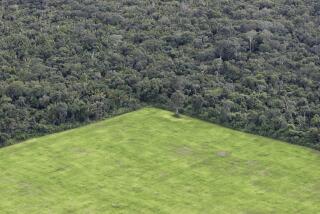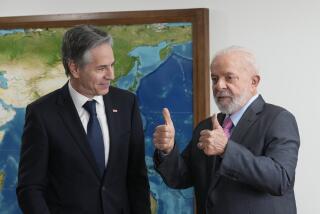Latin Leaders Push for Regional Alliance : Economy: No longer do the South Americans blame the industrialized world for all of their problems.
ICA, Peru — Seven Latin American presidents, their nations mired in inflation and recession, resolved Thursday to push forward with economic integration by 1992 to keep from falling behind the world’s emerging regional economic blocs.
Ending their third annual summit a day early, the group also reaffirmed the suspension of Panama to protest Gen. Manuel A. Noriega’s crushing of democracy there. However, the seven presidents stopped short of expelling Panama outright, as some countries wanted.
While condemning Noriega for flouting democracy in Panama, the presidents noted that democratic rule has been consolidated throughout the region in the 1980s, including this year in Chile and Paraguay. The priority now, the group declared, is to match that political freedom with economic and social justice.
The presidents’ remarks in opening the conference Wednesday and the closing communique Thursday offered a measure of the changing attitudes in the region: No longer did they place all blame on the industrialized world for their problems of debt, violence and economic decline. Rather, the tone was one of looking within both for the diagnosis and the cure.
The presidents said their foreign ministers will meet Dec. 4-5 in Argentina to devise a program for major advances in Latin American integration before 1992. That year is both the 500th anniversary of Columbus’ discovery of America and the year when the European Community will complete its economic integration, cited as a model by several presidents.
They stated several goals: substituting regional import bans with tariffs and then gradually reducing those tariffs; removing physical obstacles to trade, especially in transport and communications, and adopting joint scientific and technology ventures. Communications and transport ministers will meet within 60 days to work out accords on joint projects involving satellites and transport links.
The so-called Group of Eight was formed in 1986 to build a political voice for Latin American democracies and initially focused on demanding concessions from more developed countries, particularly on the region’s foreign debt of more than $400 billion. This time, the stress was on self-help.
The three newly elected presidents, Carlos Saul Menem of Argentina, Carlos Salinas de Gortari of Mexico and Carlos Andres Perez of Venezuela, emphasized the need to modernize the region’s economies and join the world marketplace--or perish in isolation.
All three of those countries have adopted painful reform plans to cut inflation, streamline their bureaucracies and reduce subsidies to industries that encouraged inefficiency and lack of competitiveness.
“In this new world, there will be constantly less space for those stuck in old nationalisms,” Menem said. “Nobody will be able to do for us that which we are not capable of doing for ourselves.”
He cautioned against a vision of Latin American unity that would merely mean regional protectionism. “That would be repeating on a larger scale the same isolationist concepts of the past,” he said.
The four other presidents at the summit are all in their final months in office. Virgilio Barco Vargas of Colombia and Julio Maria Sanguinetti of Uruguay already have embraced conservative economic programs, and their economies are comparatively healthy.
The final pair, Alan Garcia of Peru and Jose Sarney of Brazil, have largely avoided the market-opening policies of their colleagues, and both economies are sinking in inflation and economic malaise. The front-runners to succeed them, however, have proposed orthodox reform programs.
Thus, the Latin group is likely to offer a markedly more conservative, uniform outlook at its next annual summit in Venezuela.
More to Read
Sign up for Essential California
The most important California stories and recommendations in your inbox every morning.
You may occasionally receive promotional content from the Los Angeles Times.










